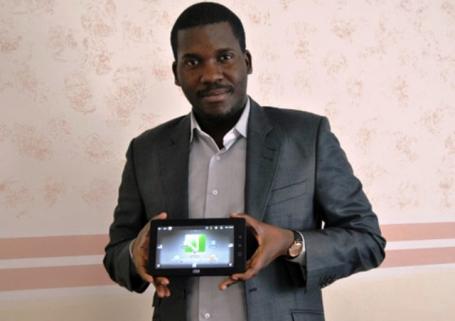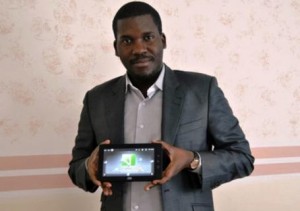
26 year old Congolese—Verone Mankou—was looking for solutions that would allow many people access the internet, he wanted a quality product at an affordable price. Instead of sourcing for cheaper products designed and manufactured overseas, he decided to create one himself. He wanted to design a low-cost personal computer, but later realized that a tablet was the ideal product. He thought it would be easy to carry, readily accessible, and possible to use even when power was not readily available. With this great vision, the first ever tablet computer wholly conceived and designed in Africa, by an African, was birthed.
Way-C Tablet, produced by VMK, Mankou’s own app-developing company, was launched in January 2012. “Way-C” means “the light of the stars” in a northern Congolese dialect. The tablet sold at less than half the price of such popular tablets like the Galaxy and the iPad. The starting price was at 150,000 CFA francs (228 Euros), compared to the first generation Samsung Galaxy sold at about 400,000 CFA francs (610 Euros) in Brazzaville, and the iPad sold at 600,000 CFA francs (914 Euros).
The Way-C tablet runs on a customized version of the Android open source operating system. It is a little smaller than the iPad 2, and weighs 380g. It has a battery life of 6 to 10 hours (depending on usage), a 1.2GHz processor, 512MB of RAM, 7 inch screen, 4GB of internal memory and supports Wi-Fi.
Though the tablet was designed in Congo, it was manufactured in China—to keep the price low, and because of a lack of factories in Congo. That doesn’t make it any less African as most technology companies manufacture their products—the Blackberry, iPad—in China. However, Mankou says there are big plans underway to bring production to Africa. His next ambition is to create an affordable smartphone manufactured in Congo.

As with all people with a vision seemingly greater than them, Verone Mankou had to pay the price of a lofty dream. He had enough critics who believed that it could not be done, and a lack of investors stalled production for about two years. He needed about 375,000 dollars (about 180 million CFA francs) that was necessary to manufacture the touchpad in China.
He is quoted as saying: “This was the hardest part. It took us two years to collect enough funds to research and develop the idea.” His patience and persistence finally paid off. The Congolese government heard of the great idea and, in an act so rare in this part of the world, invested 50% of the funds he needed. He was also bailed out financially by the Congolese Ministry of Posts and Telecommunications, a few African businessmen, and the Chinese assembly plant where the tablets were made, in the form of an advance.
He stands by the quality of his product, and its ability to compete favourably with popular tablets manufactured by companies like Apple, Samsung, and Research in Motion, saying, “in technological terms, this tablet is equivalent to all those that can be found on the market.”
There is a reason why countries like the United States and the UK are super powers, and why China is becoming the most industrialised nation in the world today. These last words by Verone Mankou inspire and challenge Africans to rise above the “receiving” end of the line. “I always believed we Africans cannot remain consumers for ever. We need to become producers. This is the vision that supported me since the beginning. We Africans should believe more in our potential. Many Africans have done great things. We must continue in this path. Young people should be aware of the difficulties to work, to finance projects. Yet, the most important thing is to believe in your ideas and make a first step towards their realization.”
Small wonder he has been referred to as the Steve Jobs of Africa.


